Catholic Social Teaching: Core Concepts, Principles, and Community
VerifiedAdded on 2020/05/08
|6
|1557
|287
Essay
AI Summary
This essay provides an overview of Catholic Social Teaching (CST) and its core principles. It begins by introducing CST's focus on human dignity, the common good, and social justice. The essay then elaborates on nine key principles: human dignity, respect for human life, the principle of association, participation, preferential protection for the poor, solidarity, stewardship, subsidiarity, and the common good. Each principle is explained with examples, such as the Catholic Church's stance on abortion and capital punishment. The essay further explores the relationship between the individual and the community, drawing parallels to the African concept of Ubuntu and the philosophies of Aristotle. It emphasizes the importance of human flourishing and the role of CST in building strong interpersonal relationships and fostering a just society. The essay concludes by highlighting the significance of CST in promoting human dignity, peace, and the common good. The essay includes several references from various sources to support the content.

University
Name Reg
Name
Course
Catholic Social Teaching Concepts
Name Reg
Name
Course
Catholic Social Teaching Concepts
Paraphrase This Document
Need a fresh take? Get an instant paraphrase of this document with our AI Paraphraser
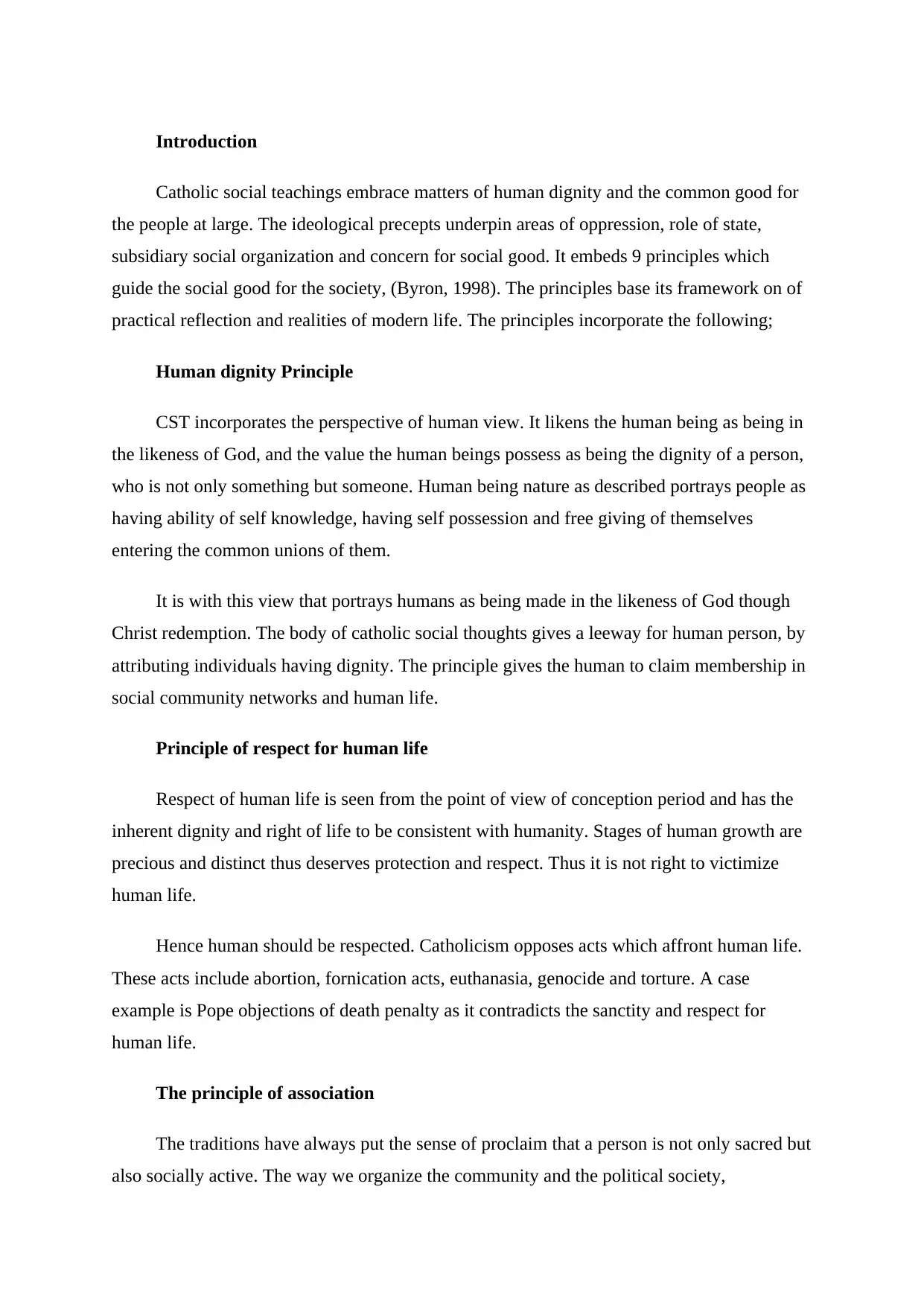
Introduction
Catholic social teachings embrace matters of human dignity and the common good for
the people at large. The ideological precepts underpin areas of oppression, role of state,
subsidiary social organization and concern for social good. It embeds 9 principles which
guide the social good for the society, (Byron, 1998). The principles base its framework on of
practical reflection and realities of modern life. The principles incorporate the following;
Human dignity Principle
CST incorporates the perspective of human view. It likens the human being as being in
the likeness of God, and the value the human beings possess as being the dignity of a person,
who is not only something but someone. Human being nature as described portrays people as
having ability of self knowledge, having self possession and free giving of themselves
entering the common unions of them.
It is with this view that portrays humans as being made in the likeness of God though
Christ redemption. The body of catholic social thoughts gives a leeway for human person, by
attributing individuals having dignity. The principle gives the human to claim membership in
social community networks and human life.
Principle of respect for human life
Respect of human life is seen from the point of view of conception period and has the
inherent dignity and right of life to be consistent with humanity. Stages of human growth are
precious and distinct thus deserves protection and respect. Thus it is not right to victimize
human life.
Hence human should be respected. Catholicism opposes acts which affront human life.
These acts include abortion, fornication acts, euthanasia, genocide and torture. A case
example is Pope objections of death penalty as it contradicts the sanctity and respect for
human life.
The principle of association
The traditions have always put the sense of proclaim that a person is not only sacred but
also socially active. The way we organize the community and the political society,
Catholic social teachings embrace matters of human dignity and the common good for
the people at large. The ideological precepts underpin areas of oppression, role of state,
subsidiary social organization and concern for social good. It embeds 9 principles which
guide the social good for the society, (Byron, 1998). The principles base its framework on of
practical reflection and realities of modern life. The principles incorporate the following;
Human dignity Principle
CST incorporates the perspective of human view. It likens the human being as being in
the likeness of God, and the value the human beings possess as being the dignity of a person,
who is not only something but someone. Human being nature as described portrays people as
having ability of self knowledge, having self possession and free giving of themselves
entering the common unions of them.
It is with this view that portrays humans as being made in the likeness of God though
Christ redemption. The body of catholic social thoughts gives a leeway for human person, by
attributing individuals having dignity. The principle gives the human to claim membership in
social community networks and human life.
Principle of respect for human life
Respect of human life is seen from the point of view of conception period and has the
inherent dignity and right of life to be consistent with humanity. Stages of human growth are
precious and distinct thus deserves protection and respect. Thus it is not right to victimize
human life.
Hence human should be respected. Catholicism opposes acts which affront human life.
These acts include abortion, fornication acts, euthanasia, genocide and torture. A case
example is Pope objections of death penalty as it contradicts the sanctity and respect for
human life.
The principle of association
The traditions have always put the sense of proclaim that a person is not only sacred but
also socially active. The way we organize the community and the political society,
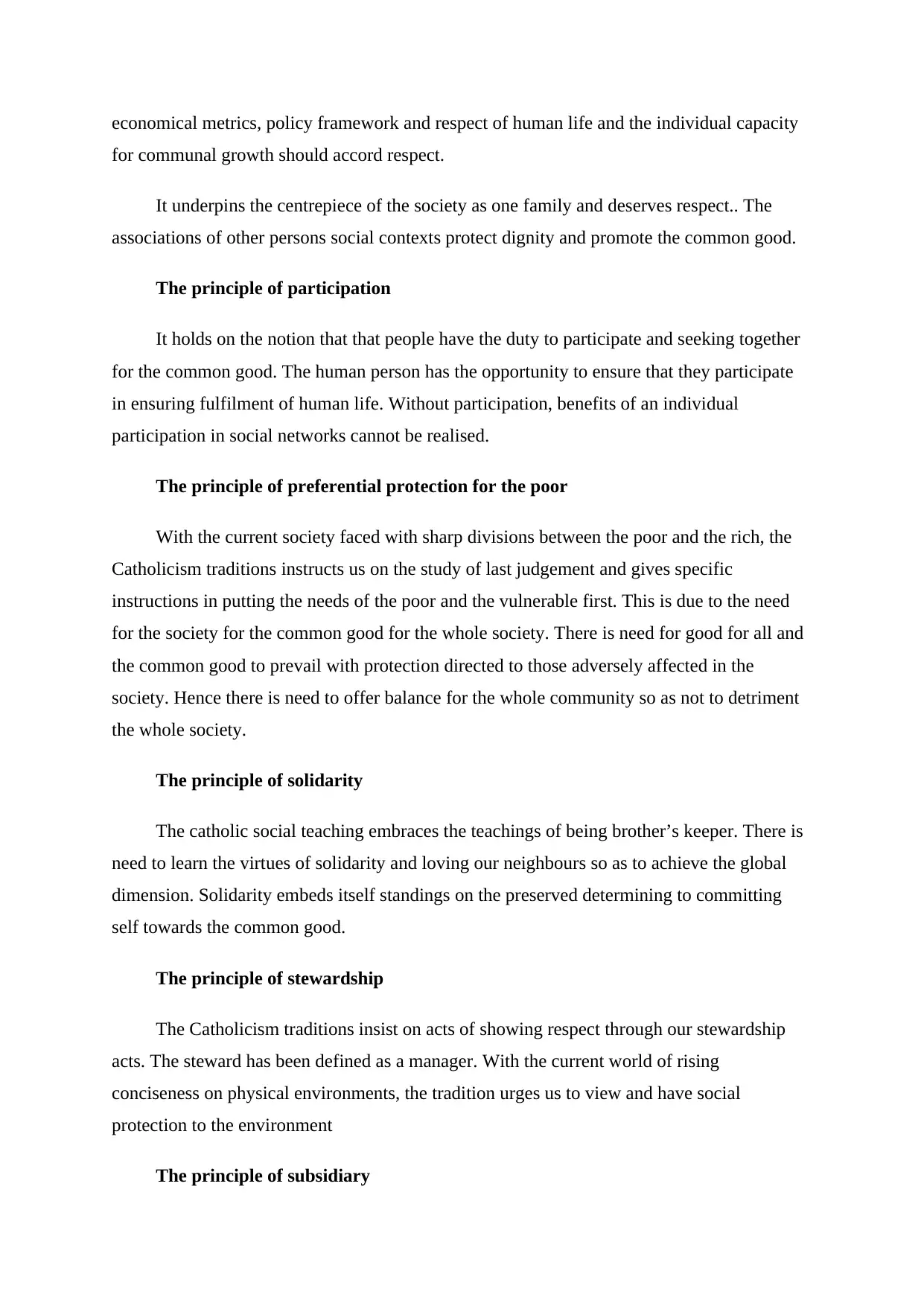
economical metrics, policy framework and respect of human life and the individual capacity
for communal growth should accord respect.
It underpins the centrepiece of the society as one family and deserves respect.. The
associations of other persons social contexts protect dignity and promote the common good.
The principle of participation
It holds on the notion that that people have the duty to participate and seeking together
for the common good. The human person has the opportunity to ensure that they participate
in ensuring fulfilment of human life. Without participation, benefits of an individual
participation in social networks cannot be realised.
The principle of preferential protection for the poor
With the current society faced with sharp divisions between the poor and the rich, the
Catholicism traditions instructs us on the study of last judgement and gives specific
instructions in putting the needs of the poor and the vulnerable first. This is due to the need
for the society for the common good for the whole society. There is need for good for all and
the common good to prevail with protection directed to those adversely affected in the
society. Hence there is need to offer balance for the whole community so as not to detriment
the whole society.
The principle of solidarity
The catholic social teaching embraces the teachings of being brother’s keeper. There is
need to learn the virtues of solidarity and loving our neighbours so as to achieve the global
dimension. Solidarity embeds itself standings on the preserved determining to committing
self towards the common good.
The principle of stewardship
The Catholicism traditions insist on acts of showing respect through our stewardship
acts. The steward has been defined as a manager. With the current world of rising
conciseness on physical environments, the tradition urges us to view and have social
protection to the environment
The principle of subsidiary
for communal growth should accord respect.
It underpins the centrepiece of the society as one family and deserves respect.. The
associations of other persons social contexts protect dignity and promote the common good.
The principle of participation
It holds on the notion that that people have the duty to participate and seeking together
for the common good. The human person has the opportunity to ensure that they participate
in ensuring fulfilment of human life. Without participation, benefits of an individual
participation in social networks cannot be realised.
The principle of preferential protection for the poor
With the current society faced with sharp divisions between the poor and the rich, the
Catholicism traditions instructs us on the study of last judgement and gives specific
instructions in putting the needs of the poor and the vulnerable first. This is due to the need
for the society for the common good for the whole society. There is need for good for all and
the common good to prevail with protection directed to those adversely affected in the
society. Hence there is need to offer balance for the whole community so as not to detriment
the whole society.
The principle of solidarity
The catholic social teaching embraces the teachings of being brother’s keeper. There is
need to learn the virtues of solidarity and loving our neighbours so as to achieve the global
dimension. Solidarity embeds itself standings on the preserved determining to committing
self towards the common good.
The principle of stewardship
The Catholicism traditions insist on acts of showing respect through our stewardship
acts. The steward has been defined as a manager. With the current world of rising
conciseness on physical environments, the tradition urges us to view and have social
protection to the environment
The principle of subsidiary
⊘ This is a preview!⊘
Do you want full access?
Subscribe today to unlock all pages.

Trusted by 1+ million students worldwide
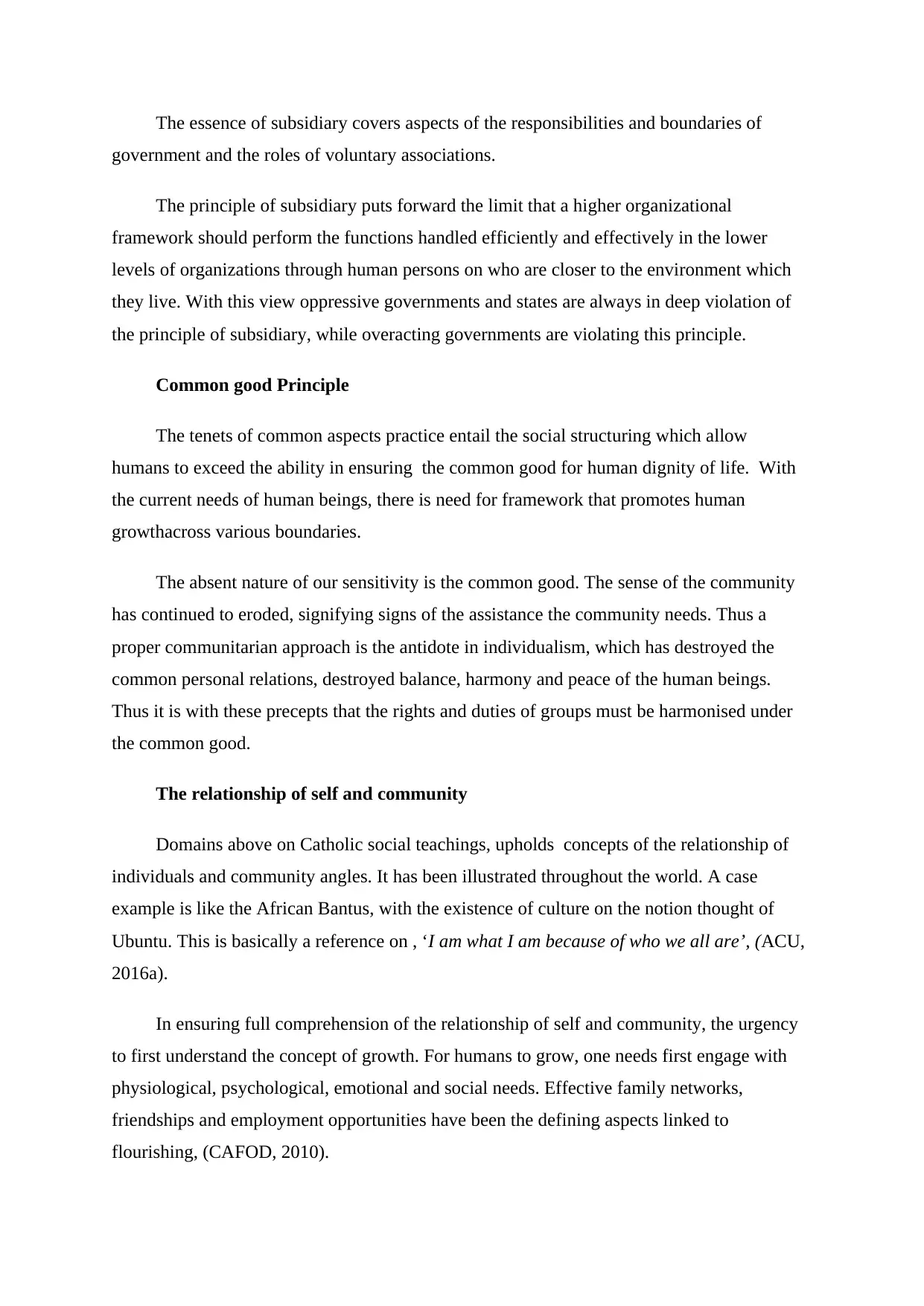
The essence of subsidiary covers aspects of the responsibilities and boundaries of
government and the roles of voluntary associations.
The principle of subsidiary puts forward the limit that a higher organizational
framework should perform the functions handled efficiently and effectively in the lower
levels of organizations through human persons on who are closer to the environment which
they live. With this view oppressive governments and states are always in deep violation of
the principle of subsidiary, while overacting governments are violating this principle.
Common good Principle
The tenets of common aspects practice entail the social structuring which allow
humans to exceed the ability in ensuring the common good for human dignity of life. With
the current needs of human beings, there is need for framework that promotes human
growthacross various boundaries.
The absent nature of our sensitivity is the common good. The sense of the community
has continued to eroded, signifying signs of the assistance the community needs. Thus a
proper communitarian approach is the antidote in individualism, which has destroyed the
common personal relations, destroyed balance, harmony and peace of the human beings.
Thus it is with these precepts that the rights and duties of groups must be harmonised under
the common good.
The relationship of self and community
Domains above on Catholic social teachings, upholds concepts of the relationship of
individuals and community angles. It has been illustrated throughout the world. A case
example is like the African Bantus, with the existence of culture on the notion thought of
Ubuntu. This is basically a reference on , ‘I am what I am because of who we all are’, (ACU,
2016a).
In ensuring full comprehension of the relationship of self and community, the urgency
to first understand the concept of growth. For humans to grow, one needs first engage with
physiological, psychological, emotional and social needs. Effective family networks,
friendships and employment opportunities have been the defining aspects linked to
flourishing, (CAFOD, 2010).
government and the roles of voluntary associations.
The principle of subsidiary puts forward the limit that a higher organizational
framework should perform the functions handled efficiently and effectively in the lower
levels of organizations through human persons on who are closer to the environment which
they live. With this view oppressive governments and states are always in deep violation of
the principle of subsidiary, while overacting governments are violating this principle.
Common good Principle
The tenets of common aspects practice entail the social structuring which allow
humans to exceed the ability in ensuring the common good for human dignity of life. With
the current needs of human beings, there is need for framework that promotes human
growthacross various boundaries.
The absent nature of our sensitivity is the common good. The sense of the community
has continued to eroded, signifying signs of the assistance the community needs. Thus a
proper communitarian approach is the antidote in individualism, which has destroyed the
common personal relations, destroyed balance, harmony and peace of the human beings.
Thus it is with these precepts that the rights and duties of groups must be harmonised under
the common good.
The relationship of self and community
Domains above on Catholic social teachings, upholds concepts of the relationship of
individuals and community angles. It has been illustrated throughout the world. A case
example is like the African Bantus, with the existence of culture on the notion thought of
Ubuntu. This is basically a reference on , ‘I am what I am because of who we all are’, (ACU,
2016a).
In ensuring full comprehension of the relationship of self and community, the urgency
to first understand the concept of growth. For humans to grow, one needs first engage with
physiological, psychological, emotional and social needs. Effective family networks,
friendships and employment opportunities have been the defining aspects linked to
flourishing, (CAFOD, 2010).
Paraphrase This Document
Need a fresh take? Get an instant paraphrase of this document with our AI Paraphraser
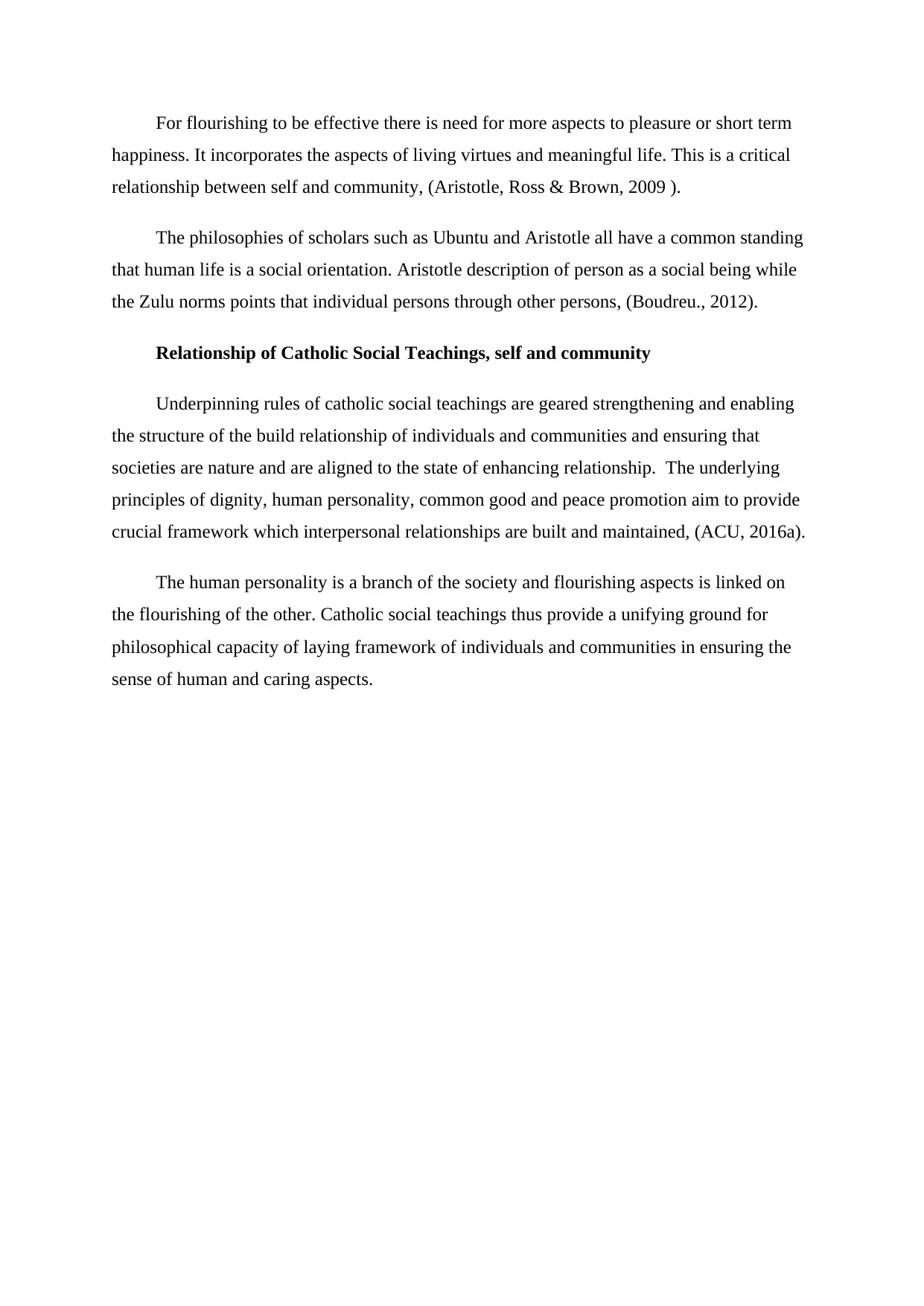
For flourishing to be effective there is need for more aspects to pleasure or short term
happiness. It incorporates the aspects of living virtues and meaningful life. This is a critical
relationship between self and community, (Aristotle, Ross & Brown, 2009 ).
The philosophies of scholars such as Ubuntu and Aristotle all have a common standing
that human life is a social orientation. Aristotle description of person as a social being while
the Zulu norms points that individual persons through other persons, (Boudreu., 2012).
Relationship of Catholic Social Teachings, self and community
Underpinning rules of catholic social teachings are geared strengthening and enabling
the structure of the build relationship of individuals and communities and ensuring that
societies are nature and are aligned to the state of enhancing relationship. The underlying
principles of dignity, human personality, common good and peace promotion aim to provide
crucial framework which interpersonal relationships are built and maintained, (ACU, 2016a).
The human personality is a branch of the society and flourishing aspects is linked on
the flourishing of the other. Catholic social teachings thus provide a unifying ground for
philosophical capacity of laying framework of individuals and communities in ensuring the
sense of human and caring aspects.
happiness. It incorporates the aspects of living virtues and meaningful life. This is a critical
relationship between self and community, (Aristotle, Ross & Brown, 2009 ).
The philosophies of scholars such as Ubuntu and Aristotle all have a common standing
that human life is a social orientation. Aristotle description of person as a social being while
the Zulu norms points that individual persons through other persons, (Boudreu., 2012).
Relationship of Catholic Social Teachings, self and community
Underpinning rules of catholic social teachings are geared strengthening and enabling
the structure of the build relationship of individuals and communities and ensuring that
societies are nature and are aligned to the state of enhancing relationship. The underlying
principles of dignity, human personality, common good and peace promotion aim to provide
crucial framework which interpersonal relationships are built and maintained, (ACU, 2016a).
The human personality is a branch of the society and flourishing aspects is linked on
the flourishing of the other. Catholic social teachings thus provide a unifying ground for
philosophical capacity of laying framework of individuals and communities in ensuring the
sense of human and caring aspects.
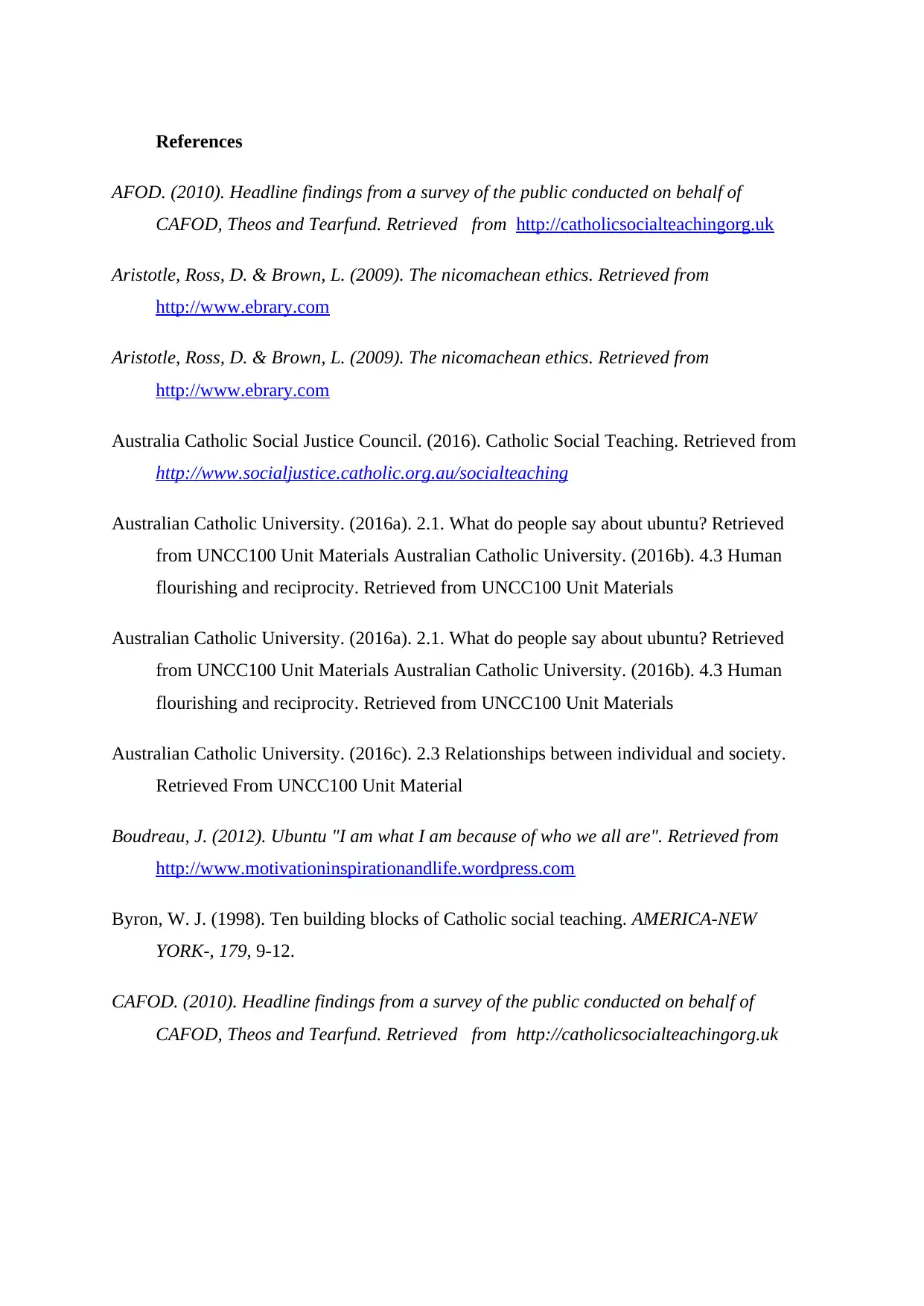
References
AFOD. (2010). Headline findings from a survey of the public conducted on behalf of
CAFOD, Theos and Tearfund. Retrieved from http://catholicsocialteachingorg.uk
Aristotle, Ross, D. & Brown, L. (2009). The nicomachean ethics. Retrieved from
http://www.ebrary.com
Aristotle, Ross, D. & Brown, L. (2009). The nicomachean ethics. Retrieved from
http://www.ebrary.com
Australia Catholic Social Justice Council. (2016). Catholic Social Teaching. Retrieved from
http://www.socialjustice.catholic.org.au/socialteaching
Australian Catholic University. (2016a). 2.1. What do people say about ubuntu? Retrieved
from UNCC100 Unit Materials Australian Catholic University. (2016b). 4.3 Human
flourishing and reciprocity. Retrieved from UNCC100 Unit Materials
Australian Catholic University. (2016a). 2.1. What do people say about ubuntu? Retrieved
from UNCC100 Unit Materials Australian Catholic University. (2016b). 4.3 Human
flourishing and reciprocity. Retrieved from UNCC100 Unit Materials
Australian Catholic University. (2016c). 2.3 Relationships between individual and society.
Retrieved From UNCC100 Unit Material
Boudreau, J. (2012). Ubuntu "I am what I am because of who we all are". Retrieved from
http://www.motivationinspirationandlife.wordpress.com
Byron, W. J. (1998). Ten building blocks of Catholic social teaching. AMERICA-NEW
YORK-, 179, 9-12.
CAFOD. (2010). Headline findings from a survey of the public conducted on behalf of
CAFOD, Theos and Tearfund. Retrieved from http://catholicsocialteachingorg.uk
AFOD. (2010). Headline findings from a survey of the public conducted on behalf of
CAFOD, Theos and Tearfund. Retrieved from http://catholicsocialteachingorg.uk
Aristotle, Ross, D. & Brown, L. (2009). The nicomachean ethics. Retrieved from
http://www.ebrary.com
Aristotle, Ross, D. & Brown, L. (2009). The nicomachean ethics. Retrieved from
http://www.ebrary.com
Australia Catholic Social Justice Council. (2016). Catholic Social Teaching. Retrieved from
http://www.socialjustice.catholic.org.au/socialteaching
Australian Catholic University. (2016a). 2.1. What do people say about ubuntu? Retrieved
from UNCC100 Unit Materials Australian Catholic University. (2016b). 4.3 Human
flourishing and reciprocity. Retrieved from UNCC100 Unit Materials
Australian Catholic University. (2016a). 2.1. What do people say about ubuntu? Retrieved
from UNCC100 Unit Materials Australian Catholic University. (2016b). 4.3 Human
flourishing and reciprocity. Retrieved from UNCC100 Unit Materials
Australian Catholic University. (2016c). 2.3 Relationships between individual and society.
Retrieved From UNCC100 Unit Material
Boudreau, J. (2012). Ubuntu "I am what I am because of who we all are". Retrieved from
http://www.motivationinspirationandlife.wordpress.com
Byron, W. J. (1998). Ten building blocks of Catholic social teaching. AMERICA-NEW
YORK-, 179, 9-12.
CAFOD. (2010). Headline findings from a survey of the public conducted on behalf of
CAFOD, Theos and Tearfund. Retrieved from http://catholicsocialteachingorg.uk
⊘ This is a preview!⊘
Do you want full access?
Subscribe today to unlock all pages.

Trusted by 1+ million students worldwide
1 out of 6
Related Documents
Your All-in-One AI-Powered Toolkit for Academic Success.
+13062052269
info@desklib.com
Available 24*7 on WhatsApp / Email
![[object Object]](/_next/static/media/star-bottom.7253800d.svg)
Unlock your academic potential
Copyright © 2020–2026 A2Z Services. All Rights Reserved. Developed and managed by ZUCOL.




